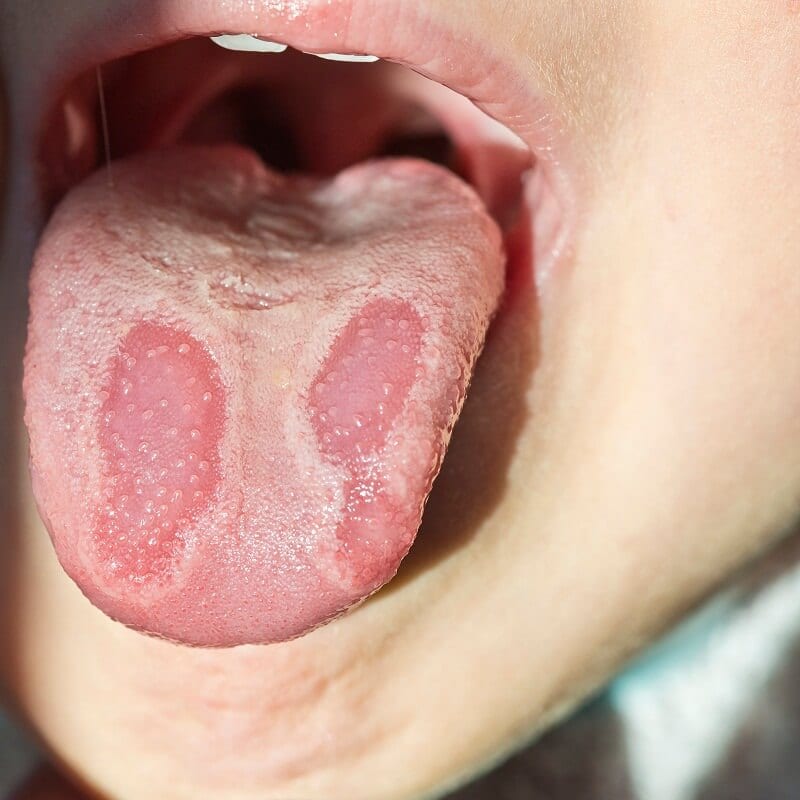If you have ever had the uncanny experience of feeling like your mouth was on fire, but you weren’t eating anything, you may be suffering from Glossodynia, or Burning Mouth Syndrome. Burning Mouth Syndrome is a rare occurrence in which sufferers experience a scalding sensation, often accompanied by tingling and severe pain on the front two-thirds of their tongues. The disorder can also affect the gums, cheeks, roof of your mouth, and the throat. Although Burning Mouth Syndrome (BMS) can affect anyone at any time, burning mouth syndrome has been documented as affecting mostly post-menopausal women (Kohorst, Bruce, and Davis).
Burning mouth syndrome can be accompanied by other symptoms such as dry mouth, soreness, or a bitter or metallic taste and causes extreme discomfort to those affected by it. Unfortunately, patients who suffer from burning mouth may also experience depression and trouble sleeping.
Burning Mouth Syndrome Causes
Causes of burning mouth syndrome are complex. Although not entirely known, it is linked to many other factors. Possible causes or triggers include:
- Oral Problems: There are several mouth conditions that contribute to burning mouth syndrome. Dry mouth, oral thrush and Sjogren’s syndrome (a disease that causes oral dryness), are suspected to cause BM flare-ups.
- Menopause and Hormonal Imbalances: People with hormonal imbalances (specifically menopausal and post-menopausal women) may have drastic variations in the amount of saliva they produce. This is also a suspected cause of BMS episodes.
- Medical Conditions: Burning or scalding sensations may result from diabetes or thyroid problems.
- Vitamin Deficiencies: Nutrition is a key factor in preventing burning mouth syndrome. Nutritional deficiencies that result from a lack of iron, zinc and B vitamins can increase your chances of experiencing dry or burning mouth.
- Acid Reflux Disease: Stomach acid can irritate the mucus membrane lining of your mouth, leading to several dental problems, and possible Burning Mouth Syndrome.
- Medications and Medical Treatments: High blood pressure medications and antidepressants are just two of the several drugs that promote burning mouth. Your pharmacist can help you determine if the medications you’re taking cause dry mouth. Burning mouth syndrome has also been linked to radiation and chemotherapy treatments.
- Mouth Irritations: There are so many irritants that can affect your dental health. Not surprisingly, acidic drinks, smoking and some mouthwashes are drying agents that contribute to the burning sensations. But other irritants play a role as well: Loose fitting dentures, bruxism, tongue thrusting and hard tooth brushing will also aggravate your oral mucosa.
- Allergies: Burning mouth may be an allergic reaction to foods or other elements in some patients.
- Nerve Damage: Damaged nerves in the mouth and on the tongue affect more than just your taste buds. Since your nerves act as pain receptors, and burning mouth syndrome may be a sign of nerve damage.
- Psychological Factors: Perhaps the most intriguing of all the elements that contribute to burning mouth syndrome are emotional stressors, such as anxiety and depression. Even if no psychological disorders were present before the onset of BMS, the discomfort and frustration felt by the patient can adversely affect his or her mental health and well-being.
Burning Mouth Syndrome Treatments
With so many potential causes, you may not be able to easily pinpoint the origin of burning mouth syndrome on your own. But your dentist can diagnose and treat the condition.
After discussing possible causes, your dentist will check for oral problems that contribute to Burning Mouth Syndrome. In some cases, your dentist may refer you to a physician for a blood test to determine if a medical condition is the source.
Although this rare ailment is difficult to diagnose, treatment can help. Your dentist might start by recommending that you eliminate things that are known to cause dry mouth like smoking, alcohol and acidic drinks. Improving your diet, drinking more fluids, and taking vitamins or saliva replacements can also assist in reducing dryness.
If necessary, medications may be prescribed to regulate any medical conditions or infections that are known to trigger BSM. Improving your symptoms may be as simple as adjusting your dentures or adopting better oral hygiene.

